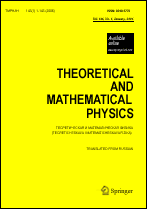|
Generalized Pascal's triangles and singular elements of modules of Lie algebras
V. D. Lyakhovsky, O. V. Postnova
St. Petersburg State University, St. Petersburg, Russia
Abstract:
We consider the problem of determining the multiplicity function m⊗pωξ in the tensor power decomposition of a module of a semisimple algebra g into irreducible submodules. For this, we propose to pass to the corresponding decomposition of a singular element Ψ((Lωg)⊗p) of the module tensor power into singular elements of irreducible submodules and formulate the problem of determining the function Motimespωξ. This function satisfies a system of recurrence relations that corresponds to the procedure for multiplying modules. To solve this problem, we introduce a special combinatorial object, a generalized (g,ω) pyramid, i.e., a set of numbers (p,{mi})g,ω satisfying the same system of recurrence relations. We prove that M⊗pωξ can be represented as a linear combination of the corresponding (p,{mi})g,ω. We illustrate the obtained solution with several examples of modules of the algebras sl(3) and so(5).
Keywords:
theory of Lie algebra representation, tensor product of modules, Weyl formula.
Citation:
V. D. Lyakhovsky, O. V. Postnova, “Generalized Pascal's triangles and singular elements of modules of Lie algebras”, TMF, 185:1 (2015), 139–150; Theoret. and Math. Phys., 185:1 (2015), 1481–1491
Linking options:
https://www.mathnet.ru/eng/tmf8932https://doi.org/10.4213/tmf8932 https://www.mathnet.ru/eng/tmf/v185/i1/p139
|


| Statistics & downloads: |
| Abstract page: | 318 | | Full-text PDF : | 161 | | References: | 59 | | First page: | 12 |
|




 Contact us:
Contact us: Terms of Use
Terms of Use
 Registration to the website
Registration to the website Logotypes
Logotypes









 Citation in format
Citation in format 